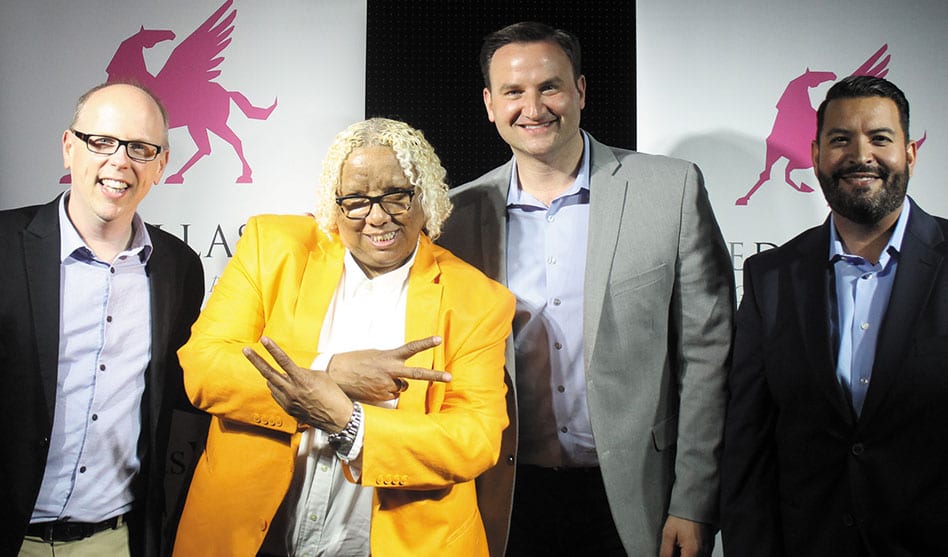Fox 4’s Steve Noviello hosted Outrageous Oral in April 2018, with speakers Betty Neal, Gary Garcia and Wesley Phelps.
The Dallas Way will conduct oral history team training to gather more stories from the community
DAVID TAFFET | Senior Staff Writer
taffet@dallasvoice.com
Finding new ways to record the history of the LGBT community in Dallas has been the goal of The Dallas Way since its inception. That effort began with finding a home for the community archives at the University of North Texas and digitizing photos and documents as well as preserving artifacts.
And through Outrageous Oral, community members have told their stories and added them to the history of the community. The Dallas Way records those pieces, making them available on YouTube. Now the group is working to expand its trove of personal stories.
The Dallas Way President De’An Roper said that last year the group began a series of roundtable discussions delving into the history of various communities within the larger LGBT community. Panels from the transgender, Latino and black communities participated, with a moderator leading the discussions.
Now, Roper said, the group will begin using a new method of collecting history that involves training a number of new volunteers. And on Jan. 26, The Dallas Way will conduct oral history team training to teach volunteers how to interview. The session will be held at Cathedral of Hope.
Nino Testa, who is a board member of The Dallas Way and involved in the training session, said University of North Texas Professor Karen Wisely and Texas Christian University Professor Rebecca Sharpless will conduct the training.
“They’ll teach best practices for taking oral histories,” he said.
He said 20 people will be trained to work in pairs to conduct the interviews. After the training, they’ll get the opportunity to practice, with 10 volunteers from Cathedral of Hope telling the story of the church.
Testa, who teaches gender studies at TCU, said his class will transcribe the interviews as a class project. He plans for students to write a reflection paper on what they’ve read to engage the class further on the LGBT community’s history.
Many of the slots for the class are already taken, Testa said, but he’s still looking for a variety of people to become interview volunteers. And he’s not looking for one particular group: He’d like younger people interested in community history as well as people who are already active or have been part of the community’s history.
Those who don’t think they’d be comfortable interviewing can volunteer to help with transcription.
Roper said it was exciting to watch the community’s history accumulate. She’s especially anxious to build on collaborations the group has already made and wants to see more stories from women, people of color and the transgender community.
“We want to hear from voices that haven’t been heard,” she said. “We want to build the archive and be as inclusive as possible.”
The teams being trained will continue taking oral histories and making them available through UNT’s LGBT archive. In addition to transcriptions of the interviews, the voice recordings will also be available online.
Librarians at UNT will help sort and categorize the interviews to help researchers access the information. Testa said his students at TCU use the archives, as do students at UNT. And of the 6 million newspaper pages archived on the UNT Portal to Texas History, the Dallas Voice is the most accessed periodical in the collection.
In addition, once interview teams are trained, Testa said he’d like to hear from people to be interviewed. He said stories can concentrate on specific incidents or about your life as a member of the LGBT community.
“Everybody has a story,” he said.
To participate in The Dallas Way oral history team training, contact Nino Testa at thedallasway.nino@gmail.com.













Fabulous!!!